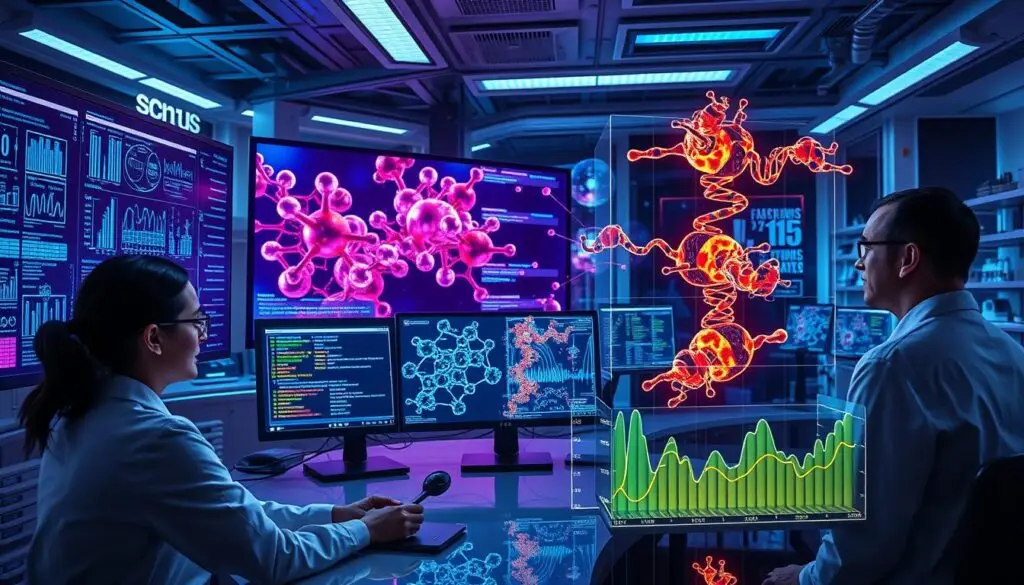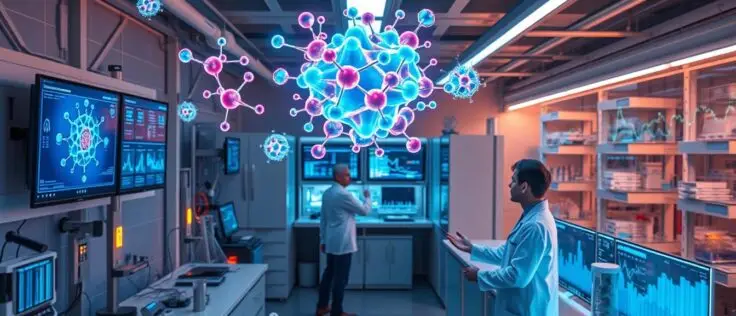Finding new drugs has always been tough, filled with scientific puzzles and too many chemical options. Now, Artificial Intelligence (AI) in Drug Discovery is making huge strides. It’s like a shining light where old methods failed. Did you know only about 10 percent of new drugs make it through trials1? There are over 10^60 chemicals and 10^160 proteins waiting to be found for new medicines1
AI and Pharmaceutical Research are teaming up to fight diseases better and faster. NVIDIA worked with Recursion Pharmaceuticals to look at over 2.8 quadrillion molecule pairs in a week. That would have taken 100,000 years the old way1. The pharma world is now using AI, including machine learning and deep learning, more and more to tackle the huge number of chemicals2.
Generative AI has been a game-changer. Look at Insilico Medicine. Using generative AI, they cut the time to develop treatments for lung disease from six years to two and a half. They saved over $360 million1. This saving means faster treatments for big health problems. Insilico even made a drug against all COVID-19 variants and started more than 30 other projects1. AI like Eularis’ platform helps predict what will sell in pharma, changing how companies think about sales and market analysis2.
We’re living in an exciting time where AI and Drug Discovery are closely linked. This connection promises to change labs and brings hope for new treatments. Think about a future where AI speeds up drug innovation, breaking limits on time and cost. It all comes down to our creativity.
The Current State of Drug Discovery and Development
The journey of creating new drugs is complex and vital for health innovation. Yet, it faces many challenges and inefficiencies. It’s a crucial step that lays the groundwork for future development.
The Conventional Drug Development Timeline
Traditionally, developing a drug takes over ten years, from start to approval. But, advances in artificial intelligence (AI) are shortening this long process. AI-driven companies, for instance, are getting to clinical trials34 faster than ever before.
Challenges in Drug Discovery
Finding new drugs is tough. Researchers struggle to find the right biological targets and to spot effective molecular interactions. AI and machine learning are now key in finding how drugs and targets interact3. This is boosting research productivity in these early stages.
Cost Implications and the Need for Efficiency
The cost of creating a new drug can hit billions. This puts pressure on the industry to be more efficient and cost-effective. AI is making strides, especially in speeding up antibiotic discovery. For example, companies like Lantern Pharma use AI to make drug development cheaper and more efficient. They’ve moved three drug candidates to clinical trials in just about three years, spending less than US$3.5m per drug4.
Introduction to AI in Drug Discovery
Understanding Artificial Intelligence and Its Capabilities
AI is revolutionising how we understand vast amounts of biomedical data. It’s great at screening lots of compounds and figuring out how molecules interact5. Thanks to AI, we can now find and test new drug targets quicker and more accurately.
AI Algorithms and Pharmaceutical Research
There are still hurdles, like trusting AI and sharing data6. But, the future looks bright as AI continues to grow in drug development.
Generative AI's Impact on Pharmaceutical Innovation
Generative AI is changing how fast drugs are discovered and developed. Recently, it reduced the time to bring new treatments to market from 11.7 years to 9.8 years. This shows how much modern technology helps in making development faster7.
This tech is making healthcare innovation smarter. It makes the early steps in finding drug targets 30% more efficient. This leads to better and more accurate treatments7.
Generative AI gives scientists a better grasp of biology and chemistry. This knowledge helps them create new treatments quickly and improve them swiftly.
About 15% of the effort in each project now involves tailoring Generative AI models. This customisation is key for personalised medicine. It makes the most of Generative AI’s benefits7.
In conclusion, Generative AI is getting better at speeding up drug development. This tech is set to boost the economy. More importantly, it aims to improve how patients are treated.
AI and Its Role in Molecule Simulation
AI has transformed the way we discover drugs by making molecule simulation better. It’s not just faster; it opens up new chances for finding treatments. This tech is key for turning complex gene info into helpful medical data.
From Gene Sequences to Molecular Structures
AI is changing drug discovery by understanding molecules like never before. In early 2020, Exscientia introduced the first AI-made drug for human trials9. AI predicts how molecules will act, leading to safer, more effective drugs.
SMILES: Bridging Chemistry and AI
SMILES is vital for combining chemistry and AI. It lets AI explore and test chemicals quickly and accurately. This skill is crucial for finding new drug possibilities fast.
In February 2022, Insilico Medicine tested its first AI-found molecule in humans, showing AI’s real power in drug discovery9.
With deeper understanding and better tech, AI is changing drug research greatly. By 2021, over $5.2 billion was put into AI for drug discovery9. This investment shows how much AI could change health care innovation.
Improving Research Efficiency with Predictive Modeling
Now, we can speed up drug development, thanks to AI. It sharpens the early stages that used to take over ten years and use billions in funding1011. Predictive modelling, key in AI, greatly boosts efficiency in pharmaceuticals. By sifting through lots of data quickly, it spots viable drug candidates. This could truly change how fast and economically we bring new treatments to market11.
DeepBind uses deep learning to find where proteins bind, making drug creation more precise10. GENTRL helps in finding new uses for existing drugs by suggesting changes. This could place them into new areas of treatment10. Predictive AI, like DeepVariant, heightens the accuracy of spotting genetic variations. This ramps up the refinement in personalised medicine10.
AI is cutting down time and costs in making drugs. Generative AI screens millions of compounds quickly, removing much of the guesswork11. By foretelling how molecules will interact with biological targets, these algorithms zoom in on the most promising candidates. This speeds up the process and cuts costs for pharmaceutical firms.
AI tools like Rosetta and ProTEN are key in developing biologics, including monoclonal antibodies and cell therapies. They ensure these complex treatments stay effective and stable, vital for their success10. With predictive modelling, AI is reaching new heights in pharmaceutical research. It promises quicker, cheaper drug development that meets the needs of patients more closely.

Biomedical Data Analysis Transformed by AI
AI has changed the game in drug discovery, making it easy to use biomedical data in pharmacy research. These smart algorithms help find important trends in complex data, which humans might not notice. This speeds up creating new drugs and understanding diseases better. For instance, AI was key in quickly finding treatments and vaccines for COVID-19 by looking at lots of viral data.
Deloitte’s 2023 report shows how AI makes clinical trials faster, cutting the time to bring drugs to the market. This will change pharmacy research, making it cheaper and more efficient12. A study also predicts the biopharma AI market will grow to $10 billion by 202413. This growth isn’t just about making new drugs but also about personalising treatments and finding new uses for existing drugs, saving money on drug discovery.
AI is great at sorting through masses of data quickly, like health records and genetic info. This leads to better predictions and helps patients more. By studying many factors, machine learning can accurately guess how patients will react to medicines. This helps to avoid bad drug reactions and make treatments more effective13.
AI’s role in pharmaceutical research and data analysis will keep growing, giving an edge to those who adopt it early. This tech brings us to a new age of medicine, with AI insights leading to quicker, safer, and cheaper treatments. To learn how AI is changing business and marketing beyond healthcare, check out this article on AI transforming marketing strategies.
Strides in Clinical Trials through AI Integration
AI is changing how drugs are developed and clinical trials are done. It makes finding new drugs faster and more precise. By using AI, we can now quickly find and test new drug targets.
Target Identification and Validation
AI helps sort through complex data to find drug targets more accurately. This lowers the time and money needed in early drug development. Traditional methods involve lots of guesswork, but AI identifies targets faster and more efficiently.
Thanks to AI, less money is spent on research and development. The cost-effectiveness of creating new drugs has gone down over 60 years. Now, drug approval costs double every nine years14.
Lead Generation and Optimisation
AI improves how we find and refine drug leads. It predicts how compounds will react, helps make drugs better, and reduces harmful effects. AI also models how patients might respond to these drugs, speeding up the development process15.
AI in clinical trials means faster, cheaper drug development. It meets today’s health care needs well. AI boosts the quality and safety of new drugs, ensuring only the best reach clinical trials.
Pioneering Healthcare Innovation: Real-world AI Applications
AI has truly changed healthcare beyond just theory. It is making real changes in drug creation and improving how we treat illnesses. Such tech advancements mean treatments can now focus more on individual needs, vastly improving patient health.
Case Study: AI-Designed Drugs for Pulmonary Disorders
Take treating lung diseases like idiopathic pulmonary fibrosis, for example. AI has cut the time and cost of developing new medicines dramatically. It uses smart pattern finding and computer simulations. This means what used to take six years now just takes two and a half. Plus, the cost is way less than the old $400 million price tag16.
Streamlined Drug Development Processes
AI does more than just make drug creation faster. It also helps find new uses for existing medicines. An AI platform named BenevolentAI spotted that a drug could fight COVID-19. This quick adapting saves time and money, crucially during health emergencies17. AI also speeds up the creation of safer, better drugs by precisely designing new molecules17.
AI isn’t stopping there. It can predict how well a patient will react to a drug based on their genetic makeup. This means doctors can tailor treatment, making it more effective and satisfying for patients17.
AI is transforming healthcare in many ways, like making operations more efficient and helping with disease prevention. It’s making the best use of resources, quickening diagnostics, and improving disease forecasts16.
Discover how AI is integrating into customer service to see its wide-ranging benefits.
New Therapies and the Role of AI
The way we create new therapies is changing thanks to AI. This tech is making drug research faster and more precise. The FDA has noticed more AI in drug applications, with over 100 in 2021 alone18. This shows a shift towards faster drug development, helped by AI’s ability to understand complex data easily18.
AI is also great at predicting how regulators will view new therapies19. This can make the review process faster, getting treatments to patients more quickly. Pharma companies like this because it means they can respond faster to health needs.
AI helps us understand the complex science behind new therapies. This means we can make them faster and they’re better suited to individual patients. AI is revolutionising how we think about and make new treatments19.
Conclusion
In the fast-changing world of Pharmaceutical Research, AI is making drug discovery much better and faster. It is set to lower the historic 60% failure rate of new drugs in trials. Thanks to smart AI algorithms, there’s a 20% improvement expected at each development stage20. This huge change could cut the cost of projects by half. It might save over a billion US dollars per new drug, making AI a key player in financial and scientific progress in Drug Development2021.
AI has a special advantage: it needs fewer patients to test new drugs. This is a big help for the 20% of cancers considered rare and often ignored20. The quick progress of AI-designed drugs to trials is impressive, as shown by Exscientia. They moved from idea to trial in just a year, much faster than the usual ten years or more21. This not only saves time but also cuts down the huge costs of testing, which can reach hundreds of millions in the early stages21.
AI’s promise also shines with the creation of huge databases, like the one for Alphafold-predicted protein structures. These databases are now available worldwide. They are crucial for exploring science and designing specific treatments20. As the market value for AI in this field is expected to hit US$4.0 billion by 2027, the pharmaceutical world is at the brink of a major shift. This shift blends AI’s sharp accuracy with big leaps in medicine21. So, as we see AI getting integrated into every aspect of Drug Development, we’re not just seeing an efficient change. We’re actually witnessing the future of treatments being shaped.
FAQ
What role does AI play in drug discovery?
AI is key to making drug discovery faster. It looks for biological targets, checks how molecules interact, and makes sure molecules are safe. It does this by using models, analyzing data, and simulating molecules. This makes pharmaceutical research more efficient, leading to new treatments.
How is AI transforming the conventional drug development timeline?
AI can cut the time it takes to develop drugs. It uses models and simulations to make the early stages quicker. Instead of taking six years, it identifies and optimizes drug candidates faster. This speeds up moving to clinical trials.
What are generative AI’s contributions to pharmaceutical innovation?
Generative AI helps by quickly making new lead compounds. It improves how we develop drugs and lowers costs. It uses AI to look at medical and chemical data. This helps create new drugs and therapies more quickly than old ways.
How does AI assist in molecule simulation?
AI helps turn complex gene and protein data into something we can use. It uses systems like SMILES to look at many chemical structures. This helps find drugs that work well and are safe.
What impact does predictive modelling have on research efficiency?
Predictive modelling uses AI to work through big data sets fast. This makes it easy to predict how molecules will interact. It makes drug development quicker by focusing on the best drug candidates.
In what ways has AI altered biomedical data analysis?
AI changes how we analyze complex data in biomedicine. It finds trends and connections that humans might miss. By understanding diseases and drug interactions better, AI helps discover new drugs.
What advancements have been made in clinical trials due to AI integration?
By using AI, we’ve gotten better at finding and checking drug candidates. AI’s smart algorithms speed up developing drugs. They ensure trials start faster and use fewer resources.
Can you give a real-world example of how AI has accelerated drug development?
Insilico Medicine used AI to develop a treatment for a lung disease in just 30 months. This is much faster than usual. It shows how AI makes drug development quicker and cheaper.
How does AI facilitate the emergence of new therapies?
AI speeds up how we find and perfect drugs. It simplifies complex bio and chemical problems. This means new treatments reach clinical trials faster, changing the market quickly and efficiently.
What are the challenges faced by AI in drug discovery?
AI in drug discovery must be accurate and keep data safe. It also must handle uncertainties in finding drugs. Solving these issues is key for AI to truly change pharmaceutical research.
Source Links
- How Generative AI Is Accelerating Drug Discovery – https://www.forbes.com/sites/bernardmarr/2024/06/19/how-generative-ai-is-accelerating-drug-discovery/
- Artificial intelligence in drug discovery and development – https://www.ncbi.nlm.nih.gov/pmc/articles/PMC7577280/
- The Role of AI in Drug Discovery: Challenges, Opportunities, and Strategies – https://www.ncbi.nlm.nih.gov/pmc/articles/PMC10302890/
- How AI is transforming drug discovery – https://pharmaceutical-journal.com/article/feature/how-ai-is-transforming-drug-discovery
- An Introduction to AI in Drug Discovery – https://medium.com/cantos-ventures/an-introduction-to-ai-in-drug-discovery-546889ebedd
- Unlocking the potential of AI in drug discovery | Reports | Wellcome – https://wellcome.org/reports/unlocking-potential-ai-drug-discovery
- Generative AI in the pharmaceutical industry: Moving from hype to reality – https://www.mckinsey.com/industries/life-sciences/our-insights/generative-ai-in-the-pharmaceutical-industry-moving-from-hype-to-reality
- Reshaping data science using generative AI – https://www.astrazeneca.com/what-science-can-do/topics/data-science-ai/generative-ai-drug-discovery-development.html
- How Artificial Intelligence is Revolutionizing Drug Discovery – Bill of Health – https://blog.petrieflom.law.harvard.edu/2023/03/20/how-artificial-intelligence-is-revolutionizing-drug-discovery/
- Predictive Models and AI Algorithms in Drug Discovery: Enhancing Efficiency and Precision – https://medium.com/@mmp3071/ai-in-drug-discovery-9b18a8ed1974
- Revolutionizing Drug Discovery: How Generative AI is Accelerating Pharmaceutical Research – https://www.linkedin.com/pulse/revolutionizing-drug-discovery-how-generative-ai-sc5sc
- Artificial Intelligence in Pharmaceutical Technology and Drug Delivery Design – https://www.ncbi.nlm.nih.gov/pmc/articles/PMC10385763/
- Revolutionising Pharma: The Impact of AI on Drug Development – Avery Fairbank – https://averyfairbank.com/revolutionising-pharma-the-impact-of-artificial-intelligence-on-drug-development/
- How AI is being used to accelerate clinical trials – https://www.nature.com/articles/d41586-024-00753-x
- AI in drug discovery and its clinical relevance – https://www.ncbi.nlm.nih.gov/pmc/articles/PMC10302550/
- AI’s role in accelerating healthcare innovation – https://kestria.com/insights/ais-role-in-accelerating-healthcare-innovation/
- AI in Healthcare: Pioneering Advancements in Diagnostics, Drug Discovery, and Personalized Medicine – https://www.linkedin.com/pulse/ai-healthcare-pioneering-advancements-diagnostics-drug-emad-raza-ynyuf
- Artificial Intelligence and Machine Learning for Drug Development – https://www.fda.gov/science-research/science-and-research-special-topics/artificial-intelligence-and-machine-learning-aiml-drug-development
- Council Post: AI Is Rapidly Transforming Drug Discovery – https://www.forbes.com/councils/forbesbusinesscouncil/2024/02/29/ai-is-rapidly-transforming-drug-discovery/
- PDF – https://www.oecd-ilibrary.org/ai-in-drug-discovery_6717b361-en.pdf?itemId=/content/component/6717b361-en&mimeType=pdf
- AI-Designed Drugs vs. Traditional Drug Discovery: Pros and Cons ⋆ Vial – https://vial.com/blog/articles/ai-designed-drugs-vs-traditional-drug-discovery-pros-and-cons/






